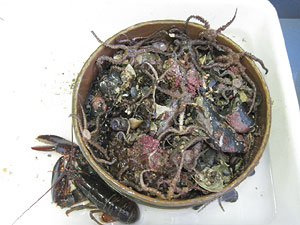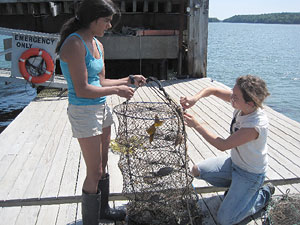

 | |||||||||||
|
|
Journals 2009/2010Jennifer Emblidge
August 20, 2009 Today I remained at the lab and sorted the suction samples from yesterday's sampling event. The first site I sorted was from the last site we collected, the control site at Mullen Head. This was a lot of fun because I used the same sample bags that were attached to the suction sampler. Since they were collected at our last site, we just kept them cold and moist over night, so most of the marine life survived. I had a couple close encounters with some larger lobsters and crabs that didn't seem too happy when I dumped them out of the bags. It kept things exciting! I must have sorted through thousands of brittle stars. In fact, I may be seeing brittle stars crawling through my dreams tonight I saw so many. After, I finished recording the information from the Mullen Head samples, with the help of Katherine and Mahima, I moved on to the frozen samples. This took the remainder of the afternoon for me and I didn't even make it through the rest of the samples. It certainly helped me gain even more respect, if possible, for the Wahle lab team of scientists!
Today you will be introduced to a member of the newly formed "scallop team" in the Wahle lab, named Mahima Jaini. Mahima is a graduate student from the University of Maine and has been a part of the Wahle lab team for a little over a year. She is originally from India where her family remains. She came to the United States in 2004 to obtain her undergraduate degree, which is also through the University of Maine in marine science. Mahima is studying lobster settlement for her Master's degree. In particular, she is looking at the interaction between the environment and how it may influence lobster settlement. She has about 20 years of past environmental data to analyze. She has started this huge task by taking a look at the satellite data that has been recorded for sea surface temperature. She is concentrating on three geographical areas for this analysis: Midcoast Maine, Beaver Harbor in Canada, and the shores of Rhode Island. So far, Mahima has seen a positive relationship with temperature approximately 2-3 before lobster settlement in the Rhode Island data. Next, Mahima plans to look at the relationship that exists between sea surface temperature and egg bearing female lobsters. After Mahima has completed her Master's degree, she plans to get her Ph.D. She is not sure what field she is going to venture into next. She has learned that she doesn't want to go into policy and decision making because she was able to get experience in this field during her undergraduate work. She enjoyed it, but she would like to stay in the field of science and she is particularly interested in ecology or conservation. Currently, Mahima is half of the two-person scallop team in the Wahle lab. I explained the goals of this team when I introduced you to the other member, Katherine. Mahima lives nice and close to the lab and seems to enjoy what Maine has to offer. This is apparent when you look at Mahima's daily activities. She is a strong swimmer and is part of a local Master's swim team. She also earned her SCUBA certification about a year ago. She really enjoys diving and all of the new doors it has opened for her and her career. During the school year, Mahima is employed as a teaching assistant for the Semester at Sea program that the University of Maine offers its undergraduates. The students stay for a semester at the Darling Center and experience hand-on field work. You can tell that Mahima really appreciates the marine environment. This can be seen in the picture below where Mahima and Katherine are attempting to get into the scallop netting so they can clean off hydroids from their shells to make them "happy."
|
||||||||||

